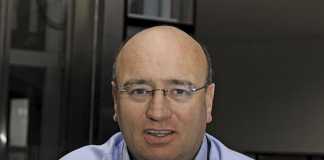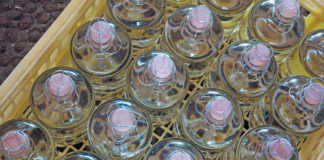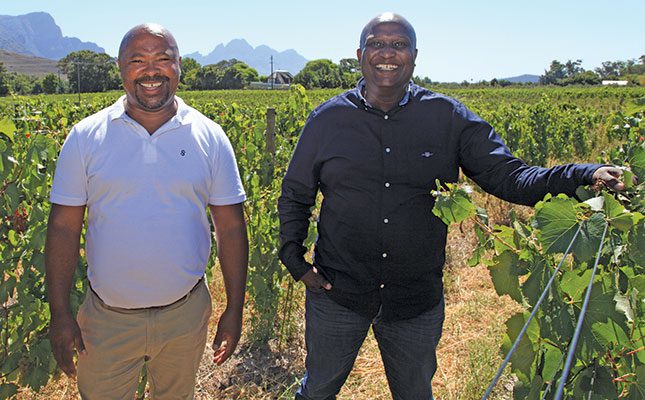
Photo: Glenneis Kriel
These days, it is almost unthinkable that any new farmer will have the financial means to buy a farm in the Franschhoek Valley of the Western Cape, as farms here go for from R1 million to more than R2,5 million per hectare, according to transactions in the past 12 months.
Paul Siguqa, however, did just that when he bought Klein Goederust for R12 million with money he saved over 15 years while working in the print media. And to make his story even more extraordinary, Siguqa is the child of a farmworker.
READ Budgeting basics: Every successful farm has one
He grew up at Backsberg Wine Estate in Simonsberg, where his mother, Nomaroma, initially worked in the vineyards, and later in the wine cellar where Hardy Laubscher taught her to make Méthode Cap Classique (MCC) sparkling wine, something she did for 37 years.
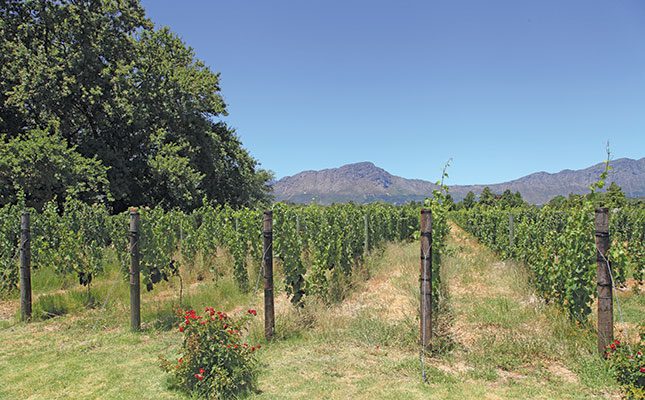
Yet, having a farmer in the family was never part of Nomaroma’s vision for her children. “My mom vowed she would be the last of her family to work on a farm.
She realised the only way to escape her fate would be through education, so even though she could not read, she always scavenged for books, magazines and newspapers. Where other children got toys for gifts, we got books,” Siguqa says.
Translating books into Xhosa as he read, so his mom could also understand, became one of his favourite pastimes, and he believes it also greatly improved his comprehension skills.
His mother also taught him to work hard to achieve his dreams.
Siguqa worked in the Backsberg cellar during school holidays and on weekends, and sold fruit as a street hawker to buy his first car and later help pay for his media studies.
A dream is born
As a child Siguqa did not want anything to do with wine, as he saw first-hand how the dop system, which was outlawed in the 1960s already, ruined the lives of farmworkers on some of the surrounding farms.
“I saw people drink, not because they like wine but to forget and escape from their poor circumstances. This in turn led to alcoholism, domestic violence, and babies with foetal alcohol syndrome (FAS). The FAS children never caught up with their healthy counterparts, and they were much more aggressive and unable to learn at school.”
READ Great managers can work miracles
While alcohol was not the sole contributor, he hated it even more when he saw the number of drop-outs in his little farm school.
“In our farm school, we started with 43 children in Grade 1. Only 12 of us were left by Grade 7, and only three by Grade 12 who managed to (reach) tertiary education,” he says.
His attitude to wine changed after he started working in the Backsberg cellar.
“The wine given to workers was a terrible quality and had high alcohol levels. At the cellar, I was exposed to a new way of drinking of wine, for enjoyment, and the art that went into the making of fine wines. It enchanted and [inspired] me to have my own wine farm,” Siguqa says.
But Nomaroma would not have any of this and encouraged him to reach beyond the farm gates. Siguqa studied media studies at university and became employed in the newspaper industry and later had his own communications company.
The desire to farm, however, remained with him, so he spoke to his best friend, Rodney Zimba, who also grew up at Backsberg and worked as a winemaker at Noble Hill, about his dream.
Zimba agreed to join Siguqa on his “crazy” journey, and when Siguqa bought Klein Goederust, the two started developing a concept of the wines best suited to their project.
“The idea was to produce small volumes of premium-quality wines that are delicious and enjoyable.
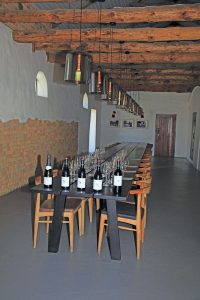
We decided that we would cap production at 100 000 bottles because these are the volumes we can comfortably manage. We are currently producing 60 000 bottles,” Siguqa says.
They have decided to keep the Klein Goederust brand name, as it was already well-established and part of the history of the farm. To make it his own, however, Siguqa added his family crest, the Southern Ground hornbill to the label, which signifies good fortune, wisdom and protection.
Building the dream
The farm came with many challenges. It had turned into a crime hotspot, so one of the first things was to fence off the land for security purposes. After that, he cleared the rubbish that had accumulated on the land, a process that took almost a year.
The vines were uprooted as they were severely neglected and suffering from leaf-roll virus. “We had to get rid of all the plant material and then fumigate the soil to ensure it was free from the virus.” Siguqa says.
Soil analysis was done to identify and correct nutritional imbalances, drainage was installed to prevent water-logging and certified virus-free vines were planted from 2020 onwards on 6,5ha of the 10ha property, based on recommendations from their viticulture consultant, Johan Viljoen.
The varieties include Chardonnay, Shiraz, Chenin Blanc, Sémillon, Mourvèdre, Grenache Blanc and Pinot Noir. “People said the region is too hot for Pinot Noir, but the variety has been doing surprisingly well so far,” Siguqa says.
READ The importance of a business plan
The Western Cape Department of Agriculture and South African Wine Industry Transformation United assisted Siguqa in 2021, with the replacement of irrigation, a tractor, the planting of some of the new vineyards as well as marketing and market access.
The provincial department helped him to apply for funding from the Department of Agriculture, Land Reform and Rural Development for the building of a boutique cellar. Siguqa expects the cellar to be finished by the end of the year.
“Up until now we have been renting cellar space. Having our own cellar will help to reduce logistics and winemaking costs and give us an opportunity to expose tourists to the wine-making process,” Siguqa says.
The two historical buildings on the farm, built in 1905 and 1920 respectively, have also been restored and turned into restaurants, one with a tasting room and office space.
Truly South African experience
Instead of following the fine-dining trend, Siguqa decided to give customers a truly South African experience at the restaurant, by offering a spitbraai buffet, “where people can enjoy a decent-sized plate of traditional South African food, ubuntu-style”.
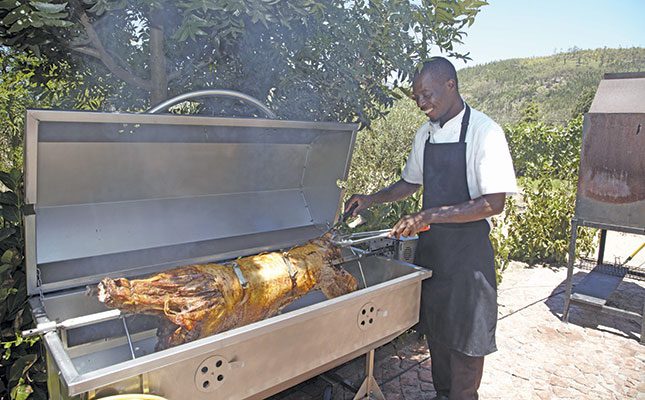
On the day of the interview, the menu included curried fish, sweet potato rolls in caramel sauce, Karoo lamb on a spit and barbecued chicken with “roosterkoek” for R495 a person.
At the tasting venue, there is an option to buy beautiful cheese boards to savour with Klein Goederust’s delectable wines. The restaurant is open from Fridays to Sundays and attracts foreigners as well as locals.
“Many people go on the Franschhoek Wine Tram, with the idea of spending an hour at each farm, and then end up staying here the whole day. Some even stay after the last tram has arrived and then go home with an Uber,” Siguqa says.
Selling the dream
Since the vineyards had to be uprooted, Siguqa initially had to bring in grapes for the wine-making process, and the volumes he bought have been reduced as his vineyards came into production.
Their wines have been a hit in the market, with their flagship wine, the Nomaroma MCC, named after Siguqa’ s mom who tastes and approves all their wines before they are released, selling out within 60 days. The MCC currently sells for just under R700 per bottle from the farm.
“Everybody wants to know how we manage to sell our MCC for such a high price. I think it really boils down to balancing quality with volumes, and offering a unique drinking experience,” Siguqa says.
He adds that it counts in his favour that he does not have any farm debt.
“Having been able to buy the farm cash and not having any debt has made things a lot easier, as I am not burdened by high interest rates and can do what I want to do without having to be accountable to the bank or a business partner.”
Support
His advice to new entrants is to get a mentor: “My farm is right next to La Motte, and I have been fortunate that Hein Koegelenberg and Hanneli Rupert have been mentoring me,” he says.
“Other farmers in the area are also always ready to help when they are needed.
“Mistakes can be the end of a small farmer like me, so it is better to surround yourself and learn from people who have already paid the school fees.”
Klein Goederust is going from strength to strength. Siguqa last year won the Western Cape’s Agricultural Writers New Entrant to Commercial Farming Award, and the Best of Wine Tourism Ambassador Awards’ Authentic South African Experience 2023.
However, what makes him even more excited is that he has been able to grow his staff from five to 24 workers, all locals, and all paid above the minimum wage.
“It is wonderful that I can live my farming dream, but I hope that my success
will help to change the narrative for farmworkers and show them that they can also achieve anything if they work hard for it,” Siguqa says.
Email Paul Siguqa at [email protected].











